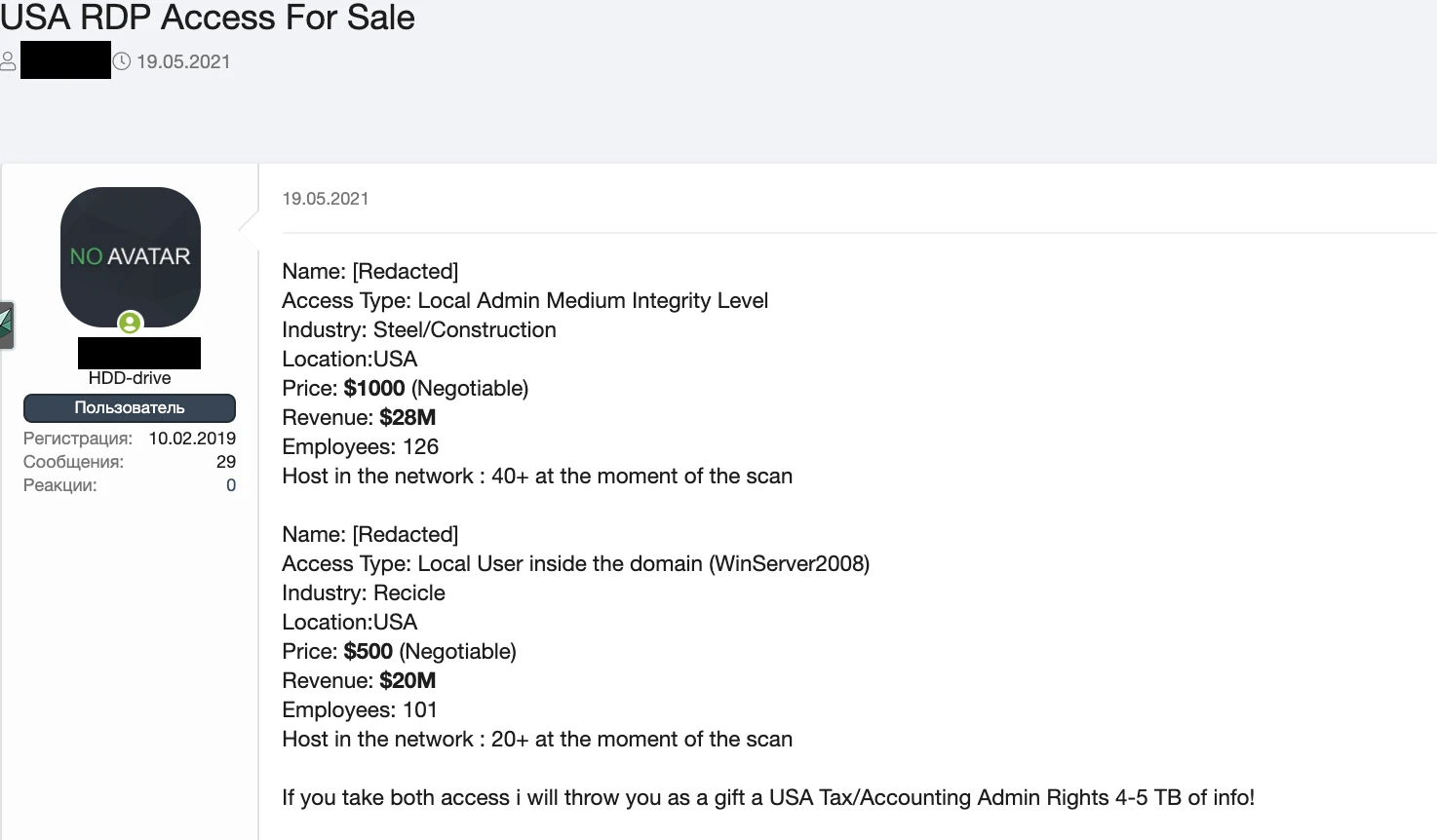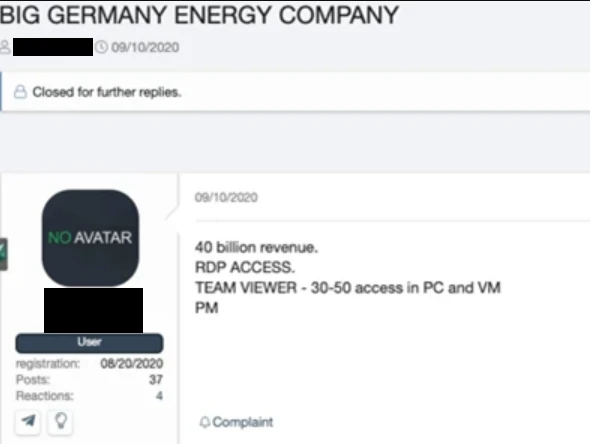Access brokers are making it easier for ransomware operators to attack businesses
A new business model has been uncovered that makes it much easier for attackers to gain access to business' networks


Cyber security researchers have uncovered a new underground business model dubbed 'access-as-a-service' in which access to an organisation's network is sold rather than an exploit or zero-day vulnerability.
So-called access brokers are selling direct access to a company's network in which they're already embedded via shared remote VPN connections. Attackers can pay different sums for varying levels of access.
The business model, discovered and detailed by Trend Micro, could lead to a new way for ransomware operators to launch attacks without having working exploit themselves.
Attackers are now able to buy their way into a network, paying only as much as they need for the right level of access to achieve their objective.
The business model relies on stolen credentials for access brokers to have a viable service and Trend Micro said businesses will have to place a greater emphasis on protecting credential theft to avoid future breaches.
"Access brokers in the criminal underground often advertise this service like it’s a cinema ticket: Somebody buys this ticket, and they get straight in," read the report. "In reality, however, things are a bit different.
RELATED RESOURCE

The best defence against ransomware
How ransomware is evolving and how to defend against it
"For example, what exactly do customers get in exchange for their money? Sometimes, it’s access to a web shell or a similar straightforward method of getting a command prompt into the compromised network. More often than not, however, it’s just a set of credentials and a VPN server to connect to."
Sign up today and you will receive a free copy of our Future Focus 2025 report - the leading guidance on AI, cybersecurity and other IT challenges as per 700+ senior executives
Remote Desktop Protocol (RDP) access and VPN-based access were the two most common products being advertised, primarily in the United States, Spain, Germany, France, and the UK.
After viewing more than a thousand adverts for services online, the most common targets Trend Micro observed were universities and schools (36%), 11% offered access to manufacturing firms and professional services, with other miscellaneous companies comprising the remainder.

Online adverts typically offer access to a company with a broad description such as 'big German energy company', offer details of the level of access available, type of access on offer (RDP or VPN), cost of the service, and in some cases details of the company's turnover and employee numbers.

Prices for services can range between a few US dollars for access to a single machine and six-digit sums for admin credentials to an entire business, but most dedicated brokers don't advertise their prices openly, according to the researchers.
Access brokers are typically advertising their products either on deep web criminal marketplaces, through a network of connections throughout underground forums, and in less common cases dedicated online shops are used for smaller-scale, single-machine access.
Trend Micro made several suggestions for businesses wary of being exploited using this new business model. Monitoring public breaches can be useful in determining if credentials may have been stolen and triggering a password reset for all staff if one is detected.
Enabling two-factor authentication (2FA) for remote staff will also help prevent remote access from criminals, as will closely monitoring user behaviour on the network.
For the most cautious, operating on a zero-trust model and assuming all staff have lost their passwords to criminals before is recommended, applying the necessary security measures where appropriate.

Connor Jones has been at the forefront of global cyber security news coverage for the past few years, breaking developments on major stories such as LockBit’s ransomware attack on Royal Mail International, and many others. He has also made sporadic appearances on the ITPro Podcast discussing topics from home desk setups all the way to hacking systems using prosthetic limbs. He has a master’s degree in Magazine Journalism from the University of Sheffield, and has previously written for the likes of Red Bull Esports and UNILAD tech during his career that started in 2015.
-
 The modern workplace: Standardizing collaboration for the enterprise IT leader
The modern workplace: Standardizing collaboration for the enterprise IT leaderHow Barco ClickShare Hub is redefining the meeting room
-
 Interim CISA chief uploaded sensitive documents to a public version of ChatGPT
Interim CISA chief uploaded sensitive documents to a public version of ChatGPTNews The incident at CISA raises yet more concerns about the rise of ‘shadow AI’ and data protection risks
-
 The FBI has seized the RAMP hacking forum, but will the takedown stick? History tells us otherwise
The FBI has seized the RAMP hacking forum, but will the takedown stick? History tells us otherwiseNews Billing itself as the “only place ransomware allowed", RAMP catered mainly for Russian-speaking cyber criminals
-
 Everything we know so far about the Nike data breach
Everything we know so far about the Nike data breachNews Hackers behind the WorldLeaks ransomware group claim to have accessed sensitive corporate data
-
 There’s a dangerous new ransomware variant on the block – and cyber experts warn it’s flying under the radar
There’s a dangerous new ransomware variant on the block – and cyber experts warn it’s flying under the radarNews The new DeadLock ransomware family is taking off in the wild, researchers warn
-
 Hacker offering US engineering firm data online after alleged breach
Hacker offering US engineering firm data online after alleged breachNews Data relating to Tampa Electric Company, Duke Energy Florida, and American Electric Power was allegedly stolen
-
 Cybersecurity experts face 20 years in prison following ransomware campaign
Cybersecurity experts face 20 years in prison following ransomware campaignTwo men used their tech expertise to carry out ALPHV BlackCat ransomware attacks
-
 Trend Micro issues warning over rise of 'vibe crime' as cyber criminals turn to agentic AI to automate attacks
Trend Micro issues warning over rise of 'vibe crime' as cyber criminals turn to agentic AI to automate attacksNews Trend Micro is warning of a boom in 'vibe crime' - the use of agentic AI to support fully-automated cyber criminal operations and accelerate attacks.
-
 15-year-old revealed as key player in Scattered LAPSUS$ Hunters
15-year-old revealed as key player in Scattered LAPSUS$ HuntersNews 'Rey' says he's trying to leave Scattered LAPSUS$ Hunters and is prepared to cooperate with law enforcement
-
 The Scattered Lapsus$ Hunters group is targeting Zendesk customers – here’s what you need to know
The Scattered Lapsus$ Hunters group is targeting Zendesk customers – here’s what you need to knowNews The group appears to be infecting support and help-desk personnel with remote access trojans and other forms of malware